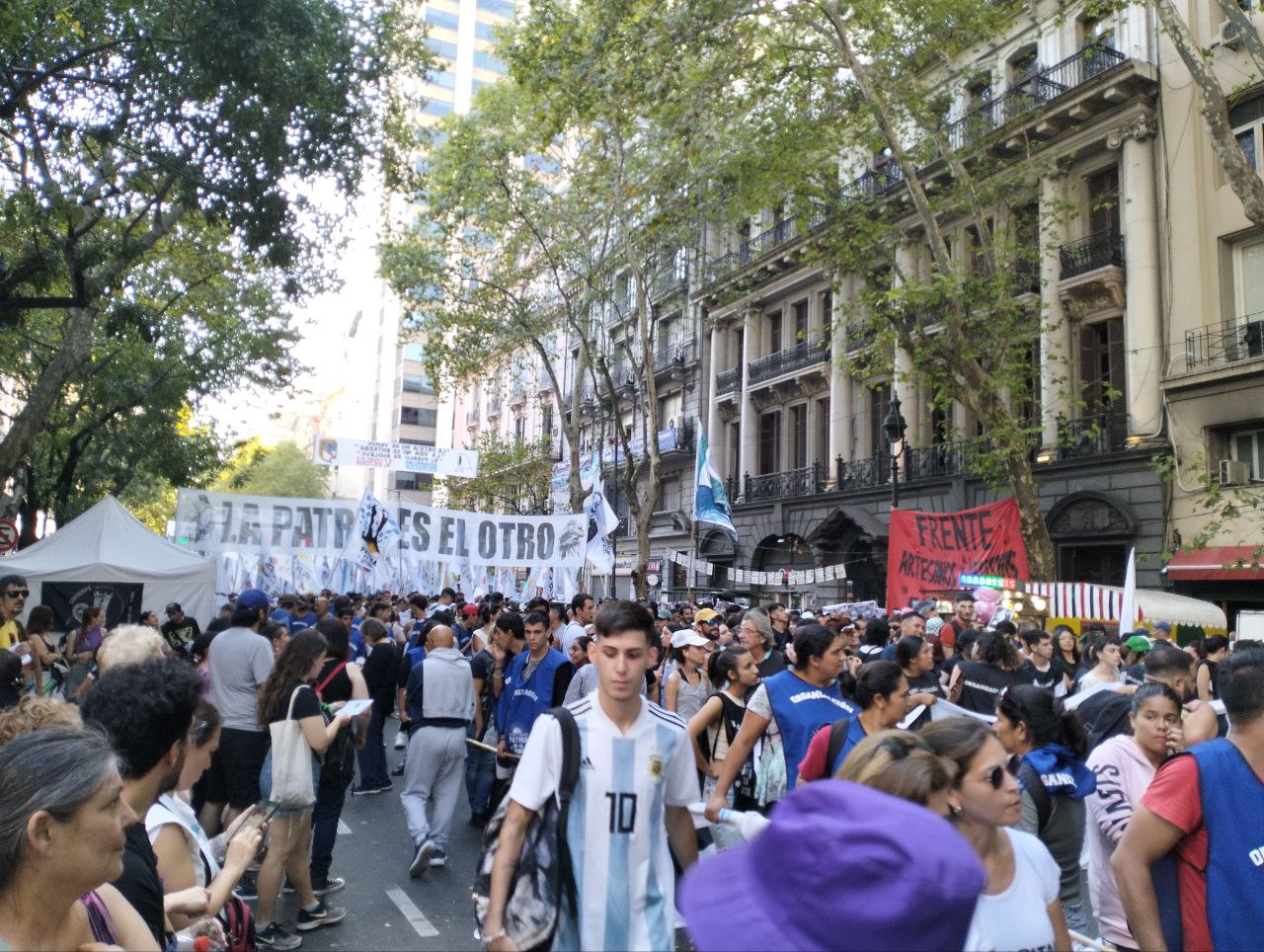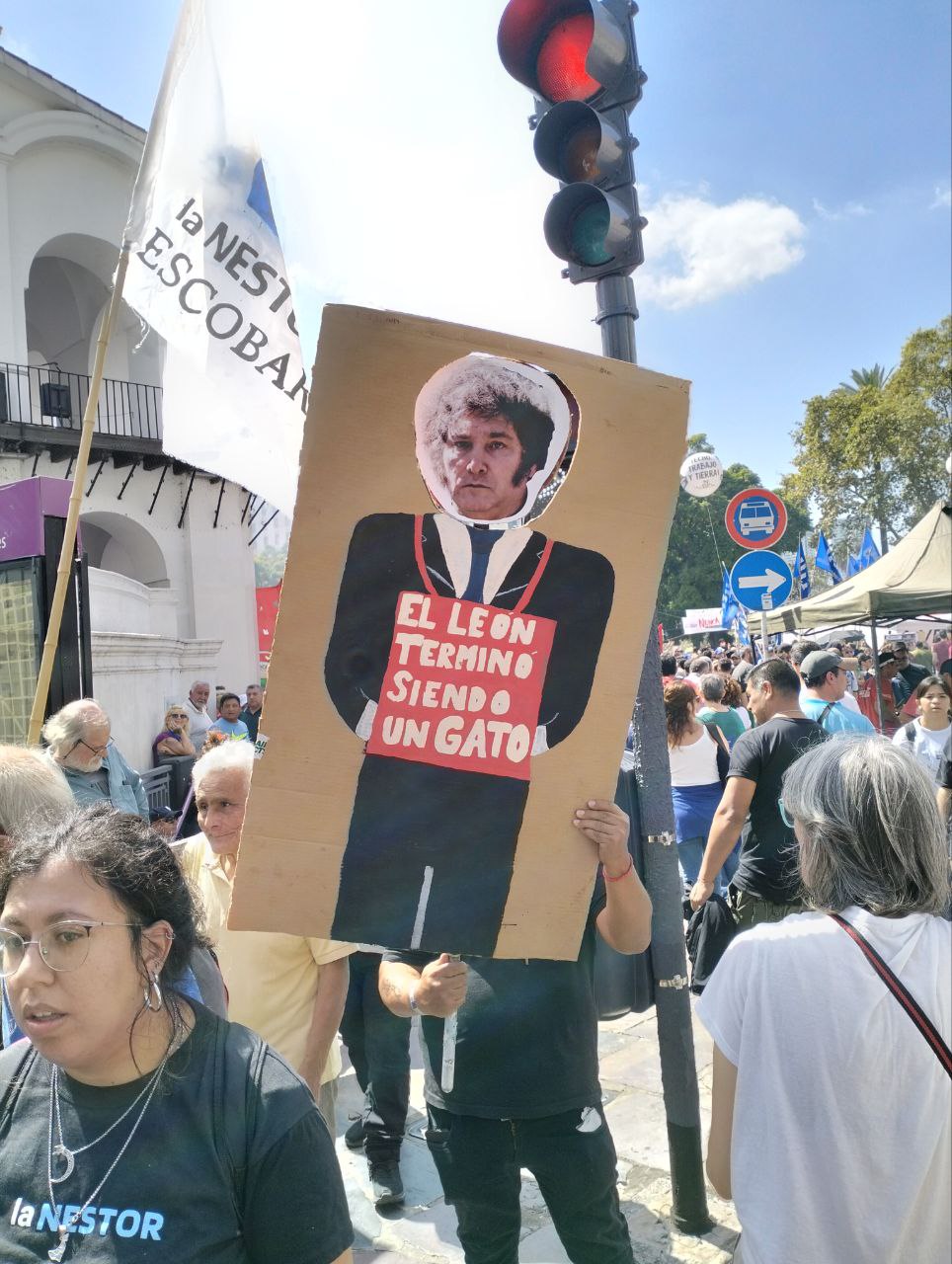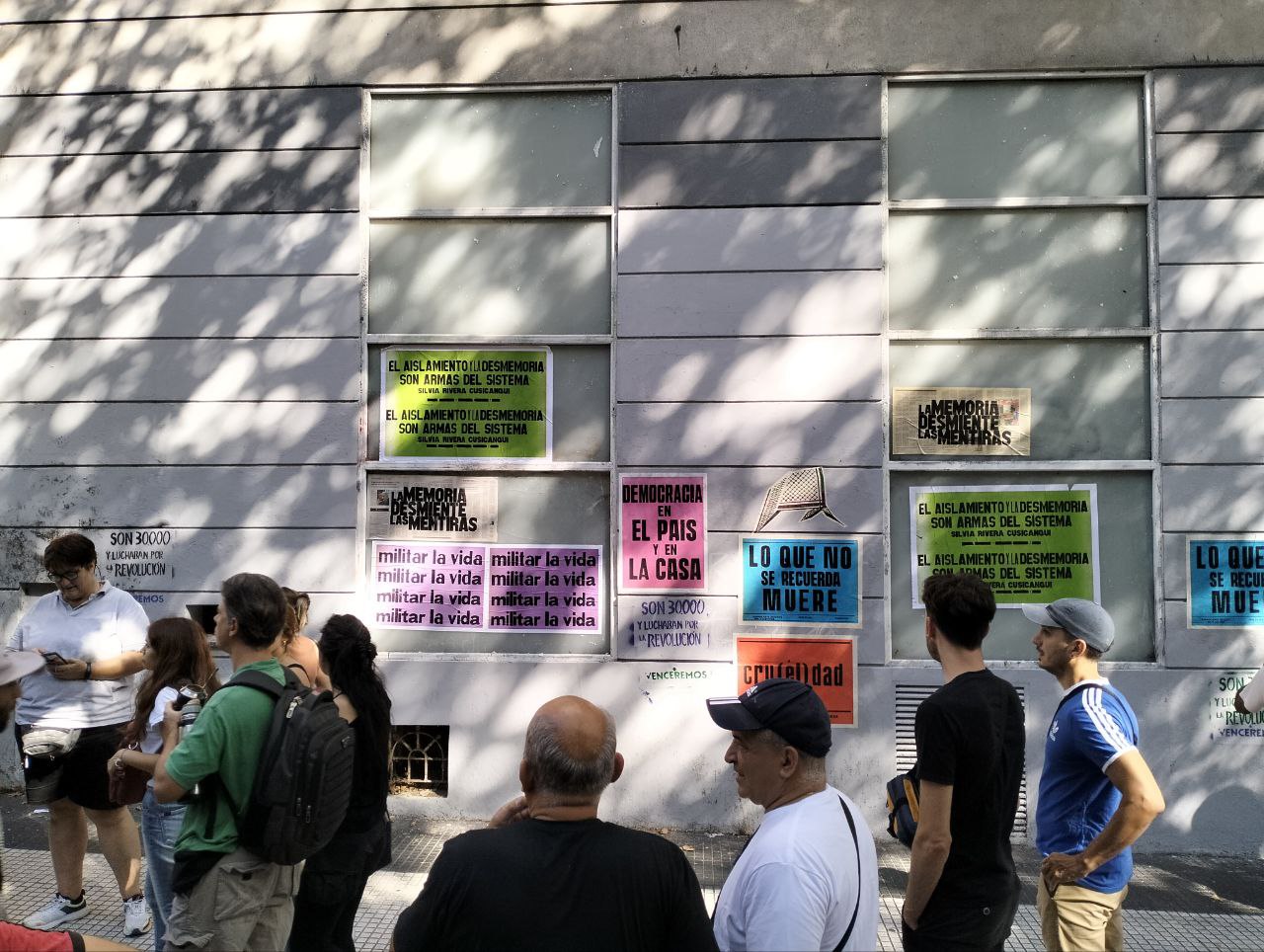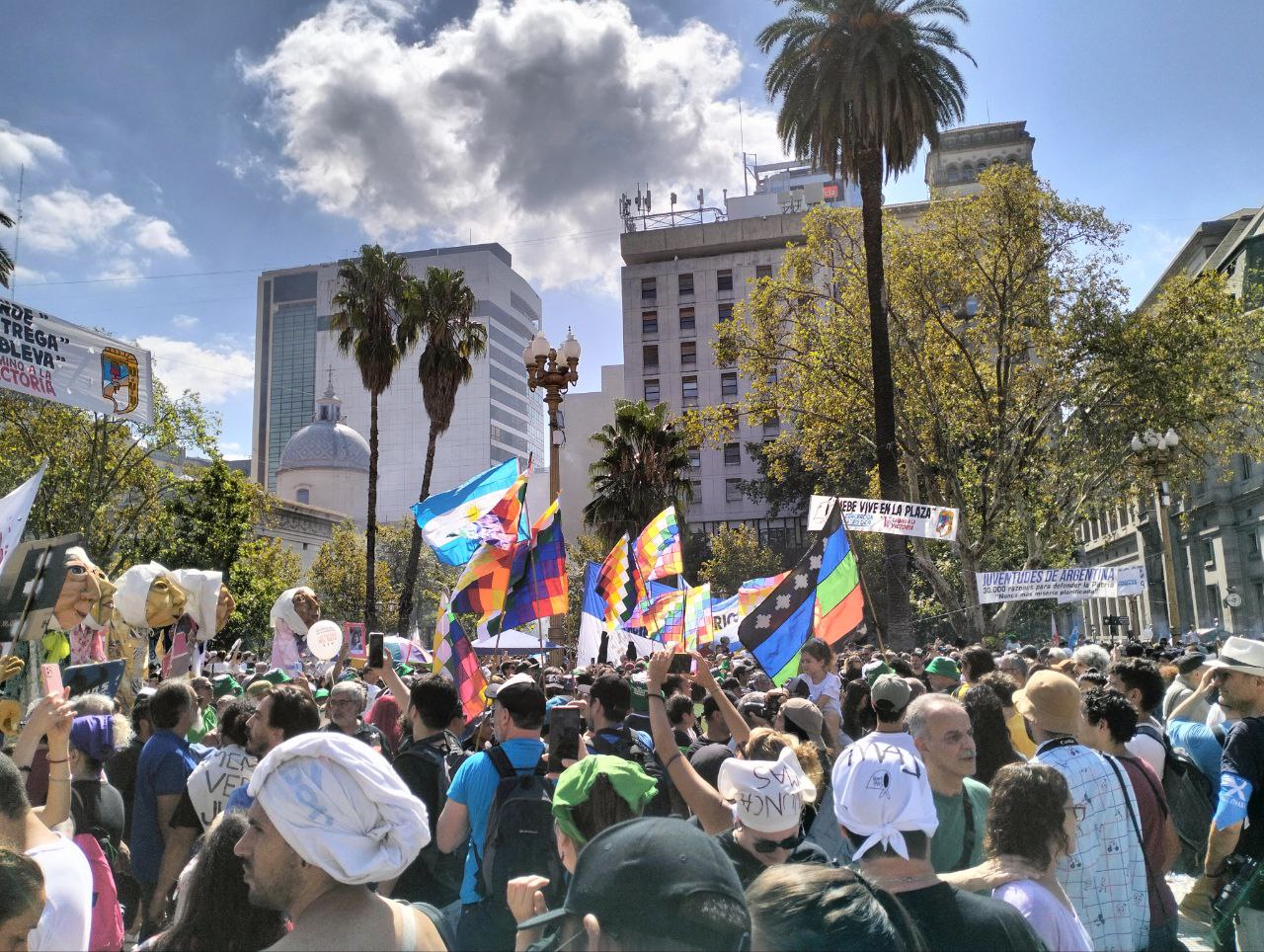Listen to this note:
Wealth dreams of stealing from the poor.
The poor dream of being able to dream.
Poetry dreams of scaring with beauty
the sadness of these days.
? Vicente Zito Lema
After hours of congregation on Avenida de Mayo; of crowding the road that, in a straight line, links the National Congress with the Casa Rosada, headquarters of the executive; of combative batucada and cumbia villera; choripanes, beer, water and soda; to wave flags of parties and their subdivisions, of unions and organizations; from the mockery of power, the challenge to arrogance, the popular counterargument, the carnival that ridicules in posters, banners and graffiti; of the historic arrival of the General Confederation of Labor (CGT), joining this mobilization for the first time; of Grandmothers and Mothers protected by security committees and applause of admiration, from the stage the last statement of unity of the march for the Day of Remembrance for Truth and Justice traces a defined rival: Javier Milei, and clearly establishes a purpose: to maintain the active struggle and roll back the emergency decree, a multifocal tool with which the president of Argentina seeks to weaken the State, cut public work positions and advance an ambitious privatization agenda with the argument of seeking reconstruction of the national economy.
It is March 24, 2024 in Buenos Aires, 48 years since, in the early hours of that day in 1976, the armed forces forcibly deposed President María Estela Martínez de Perón to install a military regime and a political of State terrorism through the persecution, detention, torture and extrajudicial execution of thousands of political dissidents. That regime, which extended its dominance over Argentine society until 1983, maintains impunity among several of its political agents while the current vice president, Victoria Villarruel, seeks pardon and house arrest for several of them, although the trial of the leadership responsible military is an example of transitional justice worldwide, as portrayed in the celebrated film Argentina, 1985, directed by Santiago Miter.

The constant fight for justice and memory of Argentine society - which throughout the territory, in tourist walks of international acclaim or in lost alleys, remembers with plaques organized by the neighborhoods the name and place of kidnapping of the victims? , despite its sustained efforts for almost half a century, has nevertheless not achieved a stable guarantee of non-repetition, to the extent that today Villarruel exercises constant violence against memory, denies the number claimed by the organizations of the total number of victims of the dictatorship, around 30 thousand people detained and disappeared, and describes the leftist movements that the military junta persecuted as terrorists with pending punishments.
Thus, despite the overflowing festivity in the streets during the day of protest this Sunday, March 24, both President Milei and Vice President Villarruel did not cease their direct confrontation against the protesters from their natural discursive terrain: social networks.
?The march of ?memory, truth and justice? He had no memory at all, since the victims of subversion were erased from history.(1) There was no truth to it either, since they manipulated statistics and hid information? and there is no justice either, since the terrorists continue to occupy positions?, retweeted from a semi-anonymous account, identified as a militant of La Libertad Avanza, the president of one of the most complex states in Latin America, in a prolonged inflationary crisis that weakened such a degree to the Kirchner candidate, Sergio Massa, that allowed Milei to win the popular vote in 2023, grouped with one of the main debt acquirers in Argentine history, the magnate and former president Mauricio Macri.

Therefore, because of this constant provocation against the social movement, accompanied by a strategic attack against public spheres, such as the Télam news agency, which is currently stopped, the National Institute of Cinema and Audiovisual Arts, or the National Institute of Statistics and Censuses, Milei is the visible rival of the march for memory in 2024, together with the vice president and the Minister of Security, Patricia Bullrich (Dinosaurs can reappear, says a poster attached to the walls, in reference to Charly García's anti-dictatorship anthem, which shows Milei, Bullrich and Villarroel with tyrannosaurus bodies).
Thus, the protesters, who although they work for the past do not settle in it, interpret that the economic program of the current president is homologous with the wave of privatization that the government of the military dictatorship operated, in the international era of application of the neoliberal project that Thatcher and Reagan were sponsored, and Miguel de la Madrid or Augusto Pinochet did the same. Perhaps that is why the pavilion quotes the Open Letter from a writer to the Military Junta, issued on the specific first anniversary of the coup d'état, on March 24, 1977, by the writer and journalist Rodolfo Walsh. The next day he was disappeared.
In the text, the author of the celebrated Massacre operation, a report on an extrajudicial execution perpetrated in 1956, after analyzing the torturing cruelty with which the uniformed men terrorized their victims, does not lose sight of the fact that the greatest violence of the regime was its thirst for privatization, since its economic policy condemned millions of Argentines to poverty, precariousness, uncertainty, exploitation.

So much time later, that is the climate in which Argentines operate today. World champions in soccer, their population multiplies in street conditions, precarious salaries force prudent spending, street vendors proliferate who, between trades or a request, seek to earn a coin, from one moment to the next since the inauguration From Milei, the money is enough for less, a new radicalized episode of an inflationary path that his predecessor in the Casa Rosada, Alberto Fernández, could not contain either.
And yet, despite the reiterations of memory to vindicate the meanings of pain, there is a good group of Argentines who voted in the majority for Milei and who in the street conversation reiterate that they not only support him, but celebrate his rhetoric as an aggressor. , a bully, his provocative style that speaks of the left as "lefties", that blames public spending for economic instability to prolong the reduction of rights, that paints collective financing as a waste that would be corrected by privatization and its alleged market competitiveness, and that it consumes as a television show, as a comedy show - of course available on TikTok - the mocking ways with which the presidential spokesperson, Manuel Adorni, exchanges words with the press, between disqualifications, minimization, ridicule, microphone denial and other scratches.
It is against that denialist climate of the vice presidency. Carlotto, no one voted for you, they voted for Javier Milei. Respect the Argentine people, who said no to you too. Wasn't it 30 thousand?, Villarruel tweets in full swing?, that repressive policy of Bullrich, that the voices are raised in a demonstration in which thousands and thousands and thousands of Argentines attend, from children around the age of five accompanied from their parents, to smiling elderly women perhaps already established in eight decades of life, or more, and who hold hands to support their passage through the streets.
?Memory denies the lies?, ?We are more people than soldiers?, ?We do not negotiate or reconcile?, ?Neither behind nor to the right?, ?Without public education there is no future?, ?Thirty thousand detained companions disappeared? Present!… Now? And always!?, "Never again?", exclaim the attendees, the graffiti in the streets, the posters attached to the wall.
And there is a repeated, common political reading that strips Milei's promise of capitalist efficiency, his projection of operating against the political caste, and interprets it as truly making the elite pay the debt of the working class, while the rich of the Politics and the private sector gather around him, comfortable, simulated under the shouting of the president.
Thus, in the vicinity of the Plaza de Mayo, a man holds the presidential effigy with a reversible face between Milei and Macri and a slogan: "The lion ended up being a cat."
"Milei is the real estate market."
"The caste has a servant."
"The debt is not mine."
The echo of the congregation is clear in its demands: Peronism, the recently deceased Hebe de Bonafini, who presided over the organization of the Mothers of Plaza de Mayo "Does Hebe live in the plaza?", the audacity with which such women alone They took to the streets taken over by the military to demand clarification of the whereabouts of their children, the Diego Armando Maradona who joined them, the popular pot with which solidarity cushions the rise in prices, the gathering of signatures in opposition to the privatize the Banco Nación, the repudiation of the International Monetary Fund, the defense with the life of democracy, restored 40 years ago.
?We, organized workers, have memory. We remember who takes our jobs, who liquefies our salaries, who devalues our currency. We remember who disappeared and killed us. Nobody forgets anything here. We think about each other, we regroup with strength, happiness and unity. We continue here. With love, tenderness and organized hatred. We will be your worst future. Brotherly fire, printed strength. We will fall on you with the weight of History. We make memory. Will we win?, reads a statement printed in red letters on white and attached to the walls.
The CGT, which from certain groups is accused of collaborating both with the anti-communist actions of the 1970s and with the current government, is explicitly called to call for a second imminent national strike (the first occurred in January 2024). ) to guarantee that their position does not remain in rhetoric and a problematization is achieved from the working base to the current government: "Enough going around: set a date, CGT!?", they point out in a shout from the stage, urging action among applause.

And if the voices of protest claim the January strike and the women's march of March 8 as two days adjacent to the mobilization of March 24, chapters in a general plan of struggle, towards the end of the day (18: 14 hours, local time) demand the outline and exercise of a constant strategy of struggle until the attempts of the president are stopped.
The festivity, the massiveness of the mobilization, the beauty of the mothers' and grandmothers' handkerchiefs stylized in an installation open to the wind, the conversion of the vehicular zebras into Argentine flags for memory, truth and justice, the agitation between drums and jumps that he who does not jump is a soldier, he who does not jump voted for Milei, well, they outline just one episode in the prolonged social clash that Argentina resists today. And as soon as Monday, March 25, enters, the day after, the president makes it clear that he will maintain his narrative confrontation against the left and the country's victims' organizations.
With just over a hundred days in office, for the South American nation and its forces in conflict and resistance, everything has yet to happen.
But there is a slogan that makes the protesters smile:
Ole Ole.
Hey, hey.
Like the Nazis
It's going to happen to them:
where they go
we will go find them.
(1) It is the discursive strategy of the right in Latin America, whether in Peru, Mexico, Chile, Guatemala, Uruguay or Argentina: to classify the guerrillas as terrorist groups, to give a touch of irrationality to their armed mobilization, to ignore the profound social reasons inequality and cancellation of political rights through traditional means that led to radicalization and leaving out of the frame, of course, systemic violence, designed, budgeted many times with the frank support of the United States and in disproportionate forces, with that these movements are persecuted, terrorized, punished or annulled, with a constant balance of innocent people from nearby areas tortured and murdered by the armies in charge of repression, as in the case of the Party of the Poor of Lucio Cabañas, in Guerrero, which motivated an excessive deployment of armed forces in that entity in southern Mexico, or the actions of the Peruvian soldiers against peasants of Ayacucho in their persecution against the Communist Party of Peru – Shining Path.
You may be interested in: Argentina prepares for mobilizations in the midst of a polarized environment




